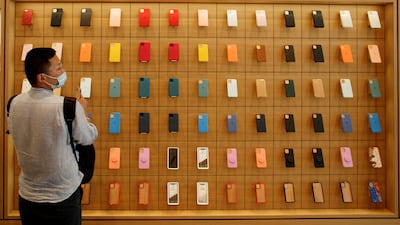Apple suffered its worst stock decline in a month following a report that Chinese government agencies have barred staff from using the iPhone and other foreign-branded devices at work.
Employees at “some” central government regulators received instructions via chat groups and in meetings to stop bringing such gadgets into the office, said the Wall Street Journal, citing people familiar with the matter. It’s not clear how widely the orders were issued, the newspaper added.
Apple's shares slid 3.6 per cent to $182.91 in New York on Wednesday, marking the biggest single-day drop since August 4.
Apple had gained 46 per cent this year before the decline, part of a broader run-up in tech stocks.
The company enjoys widespread popularity in China, its largest international market, despite rising resentment of American efforts to contain the Asian country’s technology industry.
Apple’s iPhones are among the country’s bestsellers and are common in both the government and private sector.
Foreign devices, however, have long been discouraged in sensitive agencies, particularly as Beijing stepped up a campaign in recent years to reduce a reliance on technology from the US.
A representative for Cupertino, California-based Apple didn’t immediately respond to a request for comment.
In 2022, Beijing ordered central government agencies and state-backed corporations to replace foreign-branded personal computers with domestic alternatives within two years, marking one of the most aggressive efforts to eradicate key overseas technology from within its most sensitive organs.
The Biden administration, meanwhile, has sought to limit exports of cutting-edge semiconductor equipment to China. And China’s top chipmaker, Semiconductor Manufacturing International, has come under scrutiny for supplying components to Huawei Technologies, a company the US has blacklisted.
Even with US-China ties fraying, Apple remains highly dependent on the Asian country – both as a manufacturing partner and a market for its products. Chief executive Tim Cook celebrated that relationship during a trip to China earlier this year, calling it “symbiotic”.
China also was one of the highlights of Apple’s results last quarter, helping offset a generally sluggish period. The company is preparing to unveil its latest iPhones next week, setting the stage for a holiday quarter that is invariably its biggest sales period of the year.

